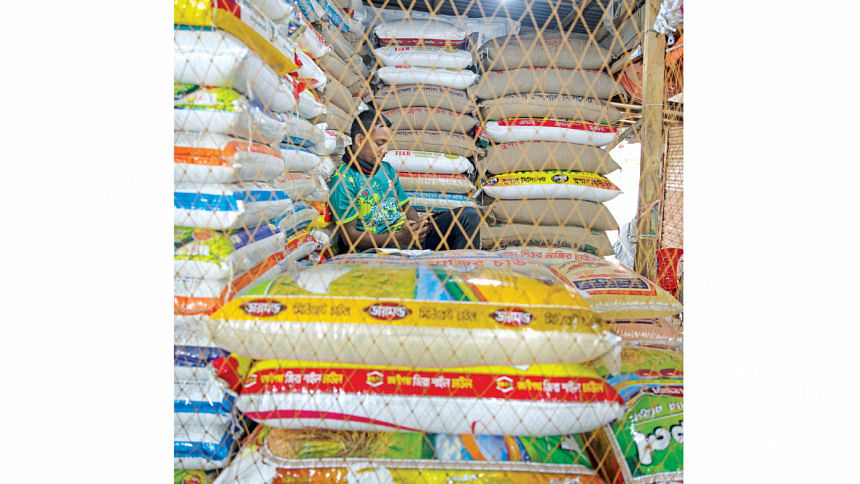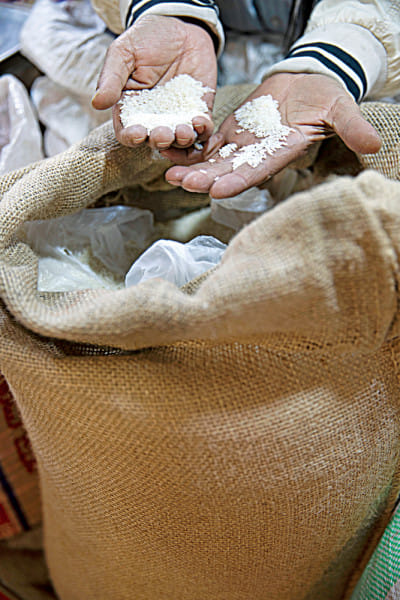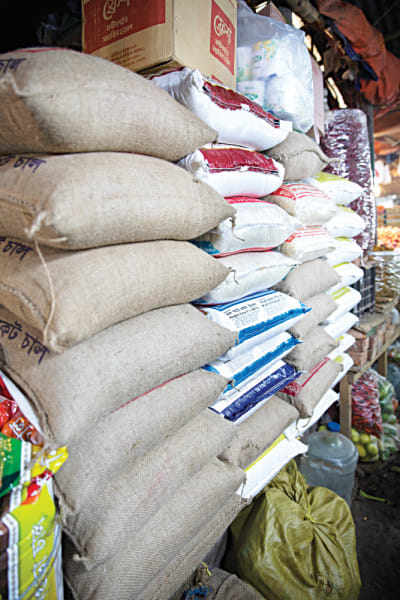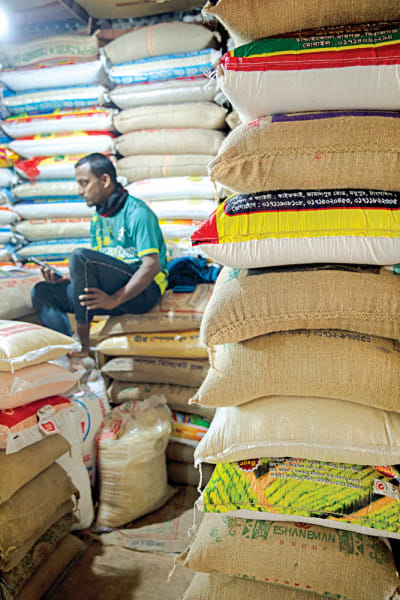How stockpiling affects the middle class


Building a society 'free from exploitation' was one of the primary goals of the Constitution we founded in 1972. The framers of the Constitution promised to secure 'the rule of law, fundamental human rights and freedom, equality and justice' — in political, economic and social frontiers, for all citizens. Stockpiling/hoarding can arguably be said to be one of the major problems that we have witnessed (or been witnessing) throughout the history of Bangladesh since its independence. In the last one year since the beginning of the Russia-Ukraine war, and amid the unbearable global recession already catered by the pandemic, stockpiling has not only become more prevalent in Bangladesh, but caused a huge toll on the lives of the middle-income families.
According to a study conducted by Bangladesh Agricultural Research Council between October 2020 - January 2021, it was found that a significant number of traders intentionally hoarded rice, potato, and onion just to increase prices amid the pandemic, even when there was a surplus of supplies from the farmers' side (The Daily Star, 27 January, 2021). The study made it clear that it was not the farmers who stockpiled for profits, rather a band of profit-seeking traders created this artificial crisis of essential items to create panic in the market and take full advantage of the situation. The study concluded that the concerned ministries could have performed better to tackle the situation.
In this backdrop, the main purpose of this write-up is to highlight the legal framework that deals with stockpiling in the country, more specifically, to narrate what constitutes stockpiling legally and how existing laws make it a punishable offence.
One of the earliest laws that criminalises stockpiling is the Essential Articles (Price Control and Anti-Hoarding) Act, 1953. It aims to control the supply and distribution of essential commodities. Under this law, the government is authorised to fix maximum prices for the retailer and wholesaler to sell an essential article. It can also fix different prices for different areas of the country.
Further, the government can ask the trader to mark the maximum price on the essential articles. It is even obligatory for the trader to display a list showing the maximum prices of essential articles in a visible place of the shop or warehouse.
As a whole, retailers or wholesalers are not allowed to sell or purchase, or deliver or accept delivery of, any essential article at a price exceeding the maximum fixed price. The law also prohibits wholesaler and retailer from keeping in its possession or under its control any unauthorised quantity of essential articles.
In case of possessing extra-quantity of essential article, the concerned wholesaler or retailer must instantly report it to the relevant officials of government who will then take necessary action as to the storage, distribution, or disposal of the excess quantity.
On 22 June 2022 the Ministry of Food circulated the Essential Foodgrains Collection, Management and Control Order, which clarifies that without license, no person or organisation can stock more than 1 metric ton of paddy, rice, wheat, or flour for trade related transaction.

In 2011, the same Ministry through another instrument, namely the Essential Commodities Act: Determining the Amount and Duration of Stock Order, forbade the stock of more than 1 metric ton of foodgrains in general.
Holding a license is a must for traders to do business with essential articles, and the government bears the duty to require traders holding stock of an essential article to sell the whole or specified part thereof at prices not exceeding the maximum fixed price.
A trader can never — except an authorisation by the government — withhold from sale or refuse to sell to any person any essential article in quantities which is contrary to the normal practices of the business. At the same time, a trader must (a) maintain accounts relating to the transaction; (b) submit such accounts, returns, reports or statements relating to the transactions; (c) get his storage/warehouse registered; and (d) keep hung up in the business centre a noticeboard quoting therein the daily stock of essential articles held in the stock. Without doing so, no trader will be allowed to store any essential article in any place other than the warehouse so registered.
In case of any doubt, the government holds the power to enter, inspect, search — and if needed, to seize — any premises, tents, vessels, or vehicles used or believed to be used for the purchase, sale, transfer, or storage for sale of any essential article.
It can also direct the owner, occupier, or other persons in charge of such locations, or any trader to produce the books, accounts, vouchers, or other documents relating to the purchase, sale, or storage for the sale of essential articles. The officer will not, however, require any family which has stored essential articles for consumption and not for sale to produce such documents.
Violation of this law may result in the application of Section 3 of the Hoarding and Black-Market Act, 1948, which is now an obsolete law but provides for a maximum penalty of three years imprisonment, or Tk 1,000 fine, or both. The court may also direct that the property in dispute be forfeited to the government.

The Control of Essential Commodities Act, 1956 and the Essential Commodities Act, 1957 were enacted obligating the government to maintain or drive up the supplies of essential commodities as well as to secure their equitable distribution and availability at fair prices in the country.
In this respect, the government can now regulate, or prohibit the production, treatment, keeping, storage, movement, transport, supply, distribution, disposal, acquisition, use or consumption of such essential commodities and/or trade and commerce.
Both the 1956 Act and 1957 Act more or less provide for similar provisions that exist in the 1953 Act. The Food (Special Courts) Act, 1956 empowered Special Magistrates to try and punish offences under the laws of 1956 and 1957. In recent years however, Executive Magistrates under the Mobile Court Act, 2009, summarily have been conducting trial of such offences.
Enacted in 1979, the Foodgrains Supply (Prevention of Prejudicial Activity) Ordinance makes it an offence to engage in any activity prejudicial to the storage, movement, transhipment, supply and distribution of foodgrains. Anyone proven guilty of such offence will be punished with imprisonment for a maximum term of three years, or Tk 5,000 fine, or both.
The law also clarifies that a person will be deemed to have engaged prejudicially to the already mentioned activities, if he/she, among others, causes, or does any act or thing calculated to cause fear or alarm among the public as to the availability of foodgrains.
That is why the government can restrict the movement of certain persons with a view to preventing him/her from engaging in prejudicial activities. Even in necessary cases, it may order to detain a responsible person for a period not more than three months. An individual can also be arrested without warrant if a reasonable suspicion exists (against him/her) of his/her possible connection to an offence punishable under this law.
Apart from these laws, Section 25 of the Special Powers Act, 1974 penalises hoarding or dealing in the black-market with death, or with imprisonment for life, or with rigorous imprisonment for a maximum term of 14 years, and fine. However, if it can be proved that the person accused of such offence was hoarding for ordinary purposes other than gaining something financially or otherwise, he/she will be punished with imprisonment for a maximum term of three months, and fine. The court can also order for the forfeiture of property related to which the offence of hoarding or dealing in the black market has been committed.
Last year, the cabinet approved the draft of "Production, Storage, Transfer, Transport, Supply, Distribution and Marketing (Prevention of Harmful Activities) of Food Products Act, 2022" with a provision of a maximum of five years' imprisonment and a Tk 10,00,000 fine as punishment for illegal production, storage, transfer, transportation, supply, distribution, and marketing of food products.
The proposed law also provided that Bangladesh Food Safety Authority and Executive Magistrates will conduct courts to counter the violation of law. The law will come into force repealing the previous 1956 and 1979 laws discussed above. As per the proposed law, the forfeited foods will be put on auction immediately if they are perishable and by 45 days if they are non-perishable items. According to the new law, a storage related offence involves the storing of foods for an unauthorised period and creating a food shortage in the market.
The above discussion reveals that not a single law specifically deals with stockpiling. Rather, it has been dealt with in different laws in isolation but only in the context of overall foodstuff management. There is even no clear definition of illegal stockpiling; rather legal provisions narrate different scenarios to characterise this phenomenon. Probably, such a legal position could be one of the reasons for the weaker governance of illegal stockpiling in Bangladesh.
Photo: Sazzad Ibne Sayed
The writer is Assistant Professor in Law, Bangladesh University of Professionals, and Law Desk In-charge, The Daily Star.

 For all latest news, follow The Daily Star's Google News channel.
For all latest news, follow The Daily Star's Google News channel. 



Comments